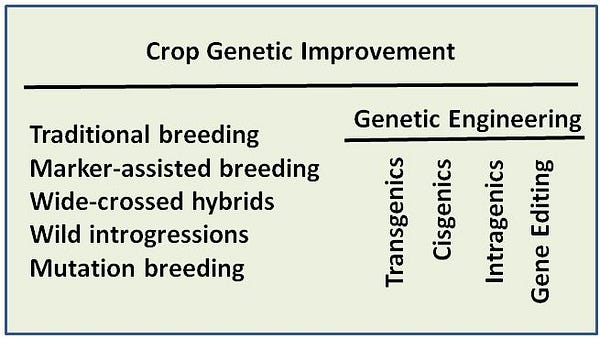Please Say No to "GMO"
Precise Science Demands Precise Nomenclature
In science and medicine, the terminology applied can be the difference between life and death, success and failure. Words have precise meanings, and a productive dialogue in the sciences requires adherence to a common set of mutually recognized terms. Shared meaning is like a verbal handshake that ensures a positive connection where information can flow.
Genetic engineering, familiarly known by the slippery colloquialism ‘GMO’, has been central to the production of drugs like insulin, enzymes used in cheese making, and laboratory-produced fibers. The widest-recognized successes have been the adoption of the technology by 20 million farmers onto almost half a billion acres of farmland, most of those in the developing world. Some 70 percent of grocery store products now contain ingredients from genetically engineered plants. And while scientists and farmers acknowledge concerns arising from the overuse of the technology, such as weed and insect resistance, there remains zero credible evidence of health-related concerns.
Still the most beautiful and altruistic applications of this technology remain to be deployed. The innovations geared to solve specific issues in hunger, environment or consumer health have not left university laboratories or government greenhouses.
This cutting edge has not been dulled due to technical problems or clandestine dangers. Instead, technology has been stalled because of high deregulation costs and negative public perception founded on misinformation.
Could part of the problem simply be the bad branding of a good technology? Our social psyche has been saturated with fear-based manufactured risk and misinformation. Could cleaning up our vocabulary advance the public’s understanding of the science and help illuminate its actual risks and benefits, while curing the tales of fear mongering?
Goodbye, “GMO”
Take for instance the abbreviation “GMO”. The term appears to have been first used thirty-three years ago this week, appropriately in the New York Times, a venue that regularly uses language to blur scientific reality in food space. Over the last decades the term has been adopted as nomenclature of derision; after all, who would want to feed their child an alien “organism”?
“GMO” is not a scientific term. Scientifically speaking, “genetic modification” is ambiguous, applying to many situations. Genetic modification is what happens upon a sexual crossing, mutation, multiplication of chromosomes (like in a seedless watermelon or banana), introduction of a single new gene from an unrelated species or the tweaking a genome with new gene editing techniques. These are all examples of genetic modification, but not all offer the predictability and precision of the process of genetic engineering.
This is why actual scientists rarely (if ever) use the “GMO” designation in technical parlance. It first regularly was highlighted in rhetoric opposing the technology, and since has sadly been adopted by mainstream media. Works that apply the term tend to disparage the technology, and opt for “GMO” rather than a scientifically precise term to stoke the negative perception.
For instance, the term “GMO” is prominently presented in the 2012 publication (retracted) by French biologist Gilles-Erich Seralini and colleagues, juxtaposed with tumor-ridden suffering animals. Their intent was to label the sad and grotesque figures of suffering animals with the three letters, G-M-O. A valid scientific effort would have labeled a figure with the gene installed that made the plant unique, not a catch-all term for an engineered plant. Seralini’s work met tremendous outcry from a scientific community that saw this as being a political and manipulative use of the scientific literature to advance an agenda.
The use of the term “GMO” in the figures is consistent with that interpretation.
In order to help advance the public discussion, we should agree to abandon the meaningless term “GMO”. This is especially important for academics, scientists, farmers, dietitians and physicians — professionals the public relies upon to answer questions about food and farming.
It is time for the science-minded community to adopt a common vocabulary to enhance effective discussion and enjoy more meaningful dialogue.
Toward a new phrasebook
Here are my suggestions for how we can adopt a common vocabulary to make sure we’re all speaking the same language about these technologies.
1. Stop using “GMO”. It is imprecise. Everything not arising as a clone is genetically modified from previous forms, as is anything changed by mutation. You are a unique genetic modification of your parent’s combined genes. A dachshund is a genetic modification of an ancestral gray wolf.
Instead we should replace “GMO” with “Genetic Engineering.” Genetic engineering is adding, subtracting, or adjusting genes in the lab that change a trait in the resulting plant, animal or microbe. It satisfies the very definition of engineering — the application of science and mathematics to affect properties of matter or the sources of energy in nature to be made useful to people.
However, the term “GMO” is something people recognize. Effective communication depends on shared meaning, so scientists or journalists should use the term once in a presentation or article parenthetically, then switch to genetic engineering. Experts should make it clear that “GMO” is not an acceptable term when discussing science.
The flawed “GMO” must also still be included in keywords, image tags, or in any online content. If it is not present, someone searching the internet for credible information with this non-scientific term may encounter a higher proportion of scientifically questionable information. Providing a parenthetical mention or brief reference ensures that those seeking science-based answers can find them.
2. An All-Encompassing Term. A better term for the scientific processes used to produce new varieties or breeds, or the intermediate steps, would be best referred to as crop or animal genetic improvement. In other words, when we use traditional breeding methods to make plants or animals better, it takes many steps and lots of selection. That’s genetic improvement, whether it is done by sexual exchange, breaking DNA strands with radiation or doubling chromosomes with chemistry.
3. The Newest Technologies. New technologies are now being used that allow scientists to make incredibly specific changes to DNA sequence, without leaving foreign DNA sequences (that some find objectionable) behind. These techniques should be collectively referred to as gene editing. Especially avoid referring to the technology by its technical name like “CRISPR/Cas 9” or “TALEN”, which are specific types of gene editing. It is important because the list of gene editing methods is inevitably growing. Gene editing is also more precise than the often used genome editing.
The purpose of this brief new glossary is not to provide a mandate based on my narrow experience and observations. Instead, my goal is to offer a proposal so a scientific community eager to precisely engage the public can challenge the pros and cons of these terms to hone an optimal vocabulary. My hope is to ultimately derive an agreed-upon terminology that can be adopted and consistently applied by experts in science, medicine and agriculture. Journalists and science communications may then adopt the precise wording of the discipline for improved precision in communication.
Concrete, unambiguous terms can help curious and concerned people understand the realities of genetic engineering. Certainly medicine has benefited from precise language, such as how childhood cognitive disabilities are now characterized with greater sensitivity and improved medical precision. This change improved social stigma of various developmental disorders, brought compassionate understanding to the conditions, and enhanced treatment for those affected.
Better scientific literacy and precision in terminology around genetic engineering would lead to a more productive discourse that ultimately could enable more rapid deployment of safe technologies that can help people and the planet. The individuals that insist on adhering to antiquated, divisive and imprecise terms will be automatically characterized as antiquated, divisive and imprecise.
The first step is to stop using the archaic, imprecise term “GMO”.



